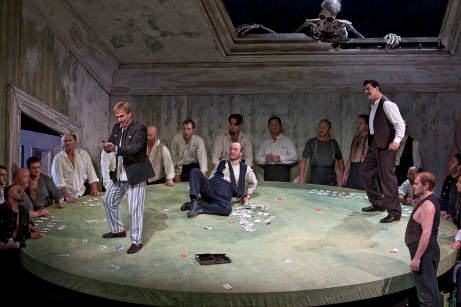Other Links
Editorial Board
-
Editor - Bill Kenny
-
Deputy Editor - Bob Briggs
Founder - Len Mullenger
Google Site Search
SEEN AND HEARD UK OPERA REVIEW
Director Richard Jones
Revival Director Benjamin Davis
Set Design John MacFarlane
Cast:
Chekalinsky, Hubert Francis
Surin, David Soar
Count Tomsky, Tómas Tómasson
Herman, Misha Didyk
Prince Yeletsky, Dario Solari
The Countess, Ann Murray
Lisa, Tatiana Monogarova
Polina, Alexandra Sherman
Governess, Neda Bizzarri
Masha, Laura Pooley
Master of Ceremonies/Chaplitsky Robin Tritschler
Narumov, Jack O’Kelly
Puppeteers, Green Ginger
Dancer, Michael Clifton-Thompson
Stage Pianist, Dorothy Hood
Chorus and Orchestra of WNO, Children’s Chorus from local schools

Act III
After some decidedly lacklustre singing and
orchestral playing over the past couple of seasons, it's a genuine pleasure to
see WNO back to its world class form with this production. Richard Jones'
setting
dates from 2000, when it was well
received for its innovation and imagination, but
nine years
on in its first ever revival, his vision remains striking
but slightly perplexing. The blend of decay and gothic horror
designed to comment on Tchaikovsky's emotional life as well
as the plot is as powerful as ever but sadly retains an element that feels
thoroughly out of place.
The action is updated to post-revolutionary Russia
where the Countess and Lisa live
together in a decaying mansion. Despite being part of Lenin’s Russia,
the
Countess has
squads of servants and can give splendid parties because
she is so rich. The Empress Catherine visits
her (to the awe and joy of all the
guests) and the Countess recalls the days of Mme de Pompadour, when she gained the secret of the three cards by sleeping with
the allegedly immortal German alchemist, the Comte St. Germain.
So far so good. Anachronisms don't matter
much in the world of the imagination
- Lisa commits suicide by putting a plastic bag over
her head - so it is easy to
read all this as the
demented ramblings of a very old lady
who lives in the past and enjoys putting on a show by dressing like Barbara
Cartland.
But what finally lost the first night audience was the giant skeleton
in Act III - as it did for Seen and Heard's
reviewer back in 2000. Everything was fine at the
beginning of the act, with an impressive bird’s eye view of
Herman in his bed - effectively claustrophobic and graphically illustrating his
increasingly obsessive state of mind
- until the skeleton crept
from under the covers to embrace
him fondly with enormous hands.
This apparition of the deceased Countess - frightened
to death earlier when Herman ripped away the towels covering her in her bath -
was greeted with roars of laughter from the audience,
repeated more loudly when the spectre leered through
the roof light at the card game where Herman loses by
playing the Queen of Spades.
Well OK. Leaving aside the idea that Richard Jones
doesn't know what he's doing - unlikely, since the direction of the crowds
and the puppet play in earlier acts were outstanding - the
laughter might be a
deliberately intended catharsis opening
everyone's eyes to the outmoded folly of what
they had just seen - personal
obsession, a doomed political revolution or aspects of Tchaikovsky's
guilt-ridden life. Or then again, it could be yet another deliberate 'post-modern' attempt to
subvert opera as an art form;
a further comment that the entire genre 'lives
in the past', no longer serves any
real function for today’s society
and needs a response that exposes it for
the pointless exercise it is. The production didn't need any
of that: it makes the important points more than clearly._&_Misha_Didyk_(Herman)_-_credit_Clive_Barda_0218.jpg)
Lisa, Tatiana Monogarova
and Herman, Misha Didyk
With only a couple of small quibbles, the cast
was uniformly excellent but
first mention must go to Alexandra Sherman as Polina, whose truly beautiful voice makes her a singer well worth
travelling to hear. Tómas Tómasson as a distinctly
malevolent Count Tomsky (and Plutus in the puppet show) and David Soar as Surin
each gave first rate performances and
Dario Solari as Prince Yeletsky
- despite a few errors in tuning - was every inch the honourable nobleman,
Tchaikovsky's equivalent of Gremin in Onegin.
Of the Countess, Ann Murray and Lisa, Tatiana Monogarova,
it remains only to say that they were both in the finest form for this opening
night, and were not only excellent vocally but were
equally polished interpreters of
their roles. Each conveyed
every aspect of their characters'
curious interior
worlds,
their tragic inabilities to communicate or to understand what was
being communicated by others, their confusion and their ultimately doomed
relationships with themselves and their contexts.
Herman, Misha Didyk,
completed a doomed trio with some powerful and (naturally) Russian-tenor singing
and his descent into progressively isolated madness was completely convincing.
The WNO chorus and orchestra were also on fine form under Alexander
Polianichko's leadership and John MacFarlane's sets - especially the
overlayed painted screens at the beginning - were marvellously skillful.
The production's run ends at the Wales Millennium Centre on May 19th and its
only touring venue is at Birmingham Hippodrome on May 29th. Grab tickets
while you can - and have more than a chuckle at the skeleton.
Bill Kenny
Pictures © Clive Barda
Back
to Top
Cumulative Index Page
